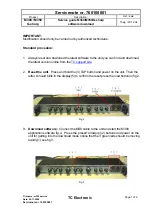
Hardware Reference Manual
Machine Connections
12
Amplifier Fault Signal (FAULT-)
This input can take a signal from the amplifier so PMAC knows when the amplifier is having problems,
and can shut down action. The polarity is programmable with I-variable Ix25 (I125 for motor 1) and the
return signal is ground (GND). FAULT1- is pin 35. With the default setup, this signal must actively be
pulled low for a fault condition. In this setup, if nothing is wired into this input, PMAC will consider the
motor not to be in a fault condition.
General-Purpose Digital Inputs and Outputs (J7 Port)
Acc-1P J7 connector provides eight general-purpose digital inputs and eight general-purpose digital
outputs. Each input and each output has its own corresponding ground pin in the opposite row. The 34-
pin connector was designed for easy interface to OPTO-22 or equivalent optically isolated I/O modules.
Delta Tau’s Acc-21F is a six-foot cable for this purpose. Characteristics of the JOPTO port on the
PMAC:
•
16 I/O points. 100 mA per channel, up to 24V
•
Hardware selectable between sinking and sourcing in groups of 8; default is all sinking
(inputs can be changed simply by moving a jumper; sourcing outputs must be special-ordered
or field-configured)
•
Eight inputs, and eight outputs only; no changes. Parallel (fast) communications to PMAC
CPU
•
Not opto-isolated; easily connected to Opto-22 (PB16) or similar modules through Acc-21F
cable
Jumper E7 on the Acc-1P board controls the configuration of the eight inputs. If it connects pins 1 and 2
(the default setting), the inputs are biased to +5V for the OFF state, and they must be pulled low for the
ON state. If E7 connects pins 2 and 3, the inputs are biased to ground for the OFF state, and must be
pulled high for the ON state. In either case, a high voltage is interpreted as a 0 by the PMAC software,
and a low voltage is interpreted as a 1.
PMAC is shipped standard with a ULN2803A sinking (open-collector) output IC for the eight outputs.
These outputs can sink up to 100 mA and have an internal 3.3 k
Ω
pull-up resistor to go high (RP18). Do
not connect these outputs directly to the supply voltage, or damage to the PMAC will result from
excessive current draw. The user can provide a high-side voltage (+5 to +24V) into Pin 33 of the J7
connector, and allow this to pull up the outputs by connecting pins 1 and 2 of Jumper E1. Jumper E2
must also connect pins 1 and 2 for a ULN2803A sinking output.
It is possible for these outputs to be sourcing drivers by substituting a UDN2981A IC for the ULN2803A.
This U7 IC is socketed, and so may easily be replaced. Usually the U7 IC is offset by two pins on its
socket, and so pins 1 and 2 usually remain open.
WARNING
Having Jumpers E1 and E2 set wrong can damage the IC. The +V output on this
connector has a 2A fuse, F1, for excessive current protection.
For this driver, the internal resistor packs pull-down instead. With a UDN2981A driver IC, Jumper E1
must connect pins 2 and 3, and Jumper E2 must connect pins 2 and 3.
Example:
Standard configuration using the ULN2803A sinking (open-collector) output IC.
Artisan Technology Group - Quality Instrumentation ... Guaranteed | (888) 88-SOURCE | www.artisantg.com
















































